Arizona, the state where Biden could lose the presidency
This former Republican bastion has been voting for Democratic representatives since 2020 thanks to the Latino vote, which accounts for 25% of the total. But disillusionment with the current president, who won the state with a margin of 11,000 votes in 2020, could define the upcoming election
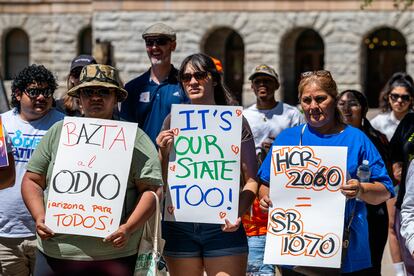

The children of Rosa Rentería, a 54-year-old homemaker, always vote. The matriarch of this mixed-status family in Phoenix (Arizona) is the one who examines the campaign proposals of the candidates, from the president down to the district level, and recommends to her children what they should mark on the ballot. “My children are the ones who cast the ballot, but I’m the one who votes,” laughs this activist for a fair immigration system — without the right to vote —, while picking up the debris from a demonstration for the cause in front of the Arizona State Capitol. Rentería had always advised her daughters to vote Democrat, the party that has traditionally captured the Latino vote in Arizona and the rest of the country. But ahead of the November elections, she admits: “Right now I’m in a quandary. Donald Trump has hurt us a lot, but President Joe Biden isn’t doing much, either.”
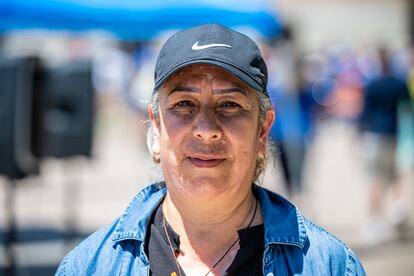
A few miles down the road, Marcel Silva, a supply chain management student at Arizona State University, admits that he is “scared” of this election. Despite describing himself as a born Democrat supporter, he doesn’t like any of the candidates this time around. In 2020, he voted without hesitation for Joe Biden, but now he “completely disagrees” with the current president’s policy on the war in Gaza. “I don’t want to vote for Biden, but I would never vote for Donald Trump either. I don’t like Biden at all, but I think I’ll end up voting for him so Trump doesn’t get elected. It’s the lesser of two evils.”
Arizona is one of the six swing states that will be key in deciding who will be the president of the United States for the next four years. It is here that the major issues of the election campaign converge: irregular immigration entering through the Mexican border; disinformation about fake election fraud; the defense of abortion rights, intensified after the state Supreme Court recovered a 19th-century law prohibiting it and local congresspeople repealed it at the beginning of this month; and climate change, palpable in mid-May temperatures already reaching 93 degrees Fahrenheit by mid-morning outside the Capitol in Phoenix, and higher still in the city’s working-class, pavement-heavy, tree-poor southern neighborhoods, where most of the Latino community lives.
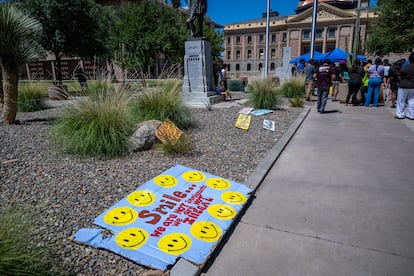
Above all, the economy is a concern. Arizona is, on paper, a booming state, driven by tourism, clean energy and investments of more than $60 billion to turn it into a major semiconductor production hub. Its unemployment rate is only 3.7%, below the national average. But the housing shortage has driven up real estate prices — the average cost of a home in Phoenix exceeds $400,000 — which in turn has driven up the cost of just about everything else. Although it has since moderated, inflation reached the highest in the country in the early years of Biden’s term.
This former Republican stronghold has undergone a colossal transformation in the last decade. In 2011, it was in the news for passing a law that allowed police to stop on the street and demand documentation from anyone they thought might be an irregular immigrant, a measure that the Supreme Court eventually struck down as unconstitutional for the most part. Since 2020, it has been in the news for electing Democratic candidates in every election cycle, including Biden himself. And in that evolution, the Latino vote has played a key role. In Arizona, this traditionally Democratic bloc represents 25% of the total, second only to the white vote. It is a prominence that will increase this November, when 150,000 young Latino voters are called to the polls for the first time.
Their mobilization is critical for Biden and the Democratic Party. In 2020, according to exit polls, 60% of Latino voters supported the current president, who ended up winning by just 11,000 ballots. But there are indications that while the majority of this community maintains its support for the Democrats, a portion, especially young people and progressives, are disenchanted. According to a poll published last Monday by The New York Times, only 36% of Hispanic respondents said they would vote for the current president. At the same time, support for Trump appears to be growing, with 26% support, according to the same poll.
“We’re starting to see especially young Latino males in this particular election starting to show a little bit more affinity for the Republican Party and the Republican vote than in previous elections,” explains Lisa Sanchez, assistant professor at the University of Arizona’s School of Government and Public Policy.
Demotivation, a possible problem
But, above all, the number has grown of voters who do not feel particularly interested in one candidate or the other, who feel that Biden has not met their expectations and that Trump is too extreme after declaring that irregular immigrants “are not people.” “They are a little disillusioned and that’s a problem to fix,” admits the state Senator Anna Hernandez, now running for District 7 of the Phoenix City Council.
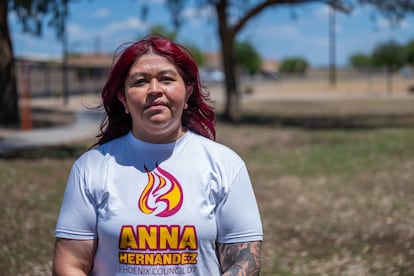
“In general, Latinos are still in favor of the Democratic Party and its policies, but there is a big concern that they just won’t be motivated to get out and vote. Biden, in particular, needs the Latino vote and in a state like Arizona, which he only won by a few thousand votes, every vote counts. If those voters are not mobilized, and there is no effort to get them out to vote, that could make a huge difference in the November election,” says Professor Stella Rouse, director of the Arizona State University (ASU) Hispanic Research Center.
Rouse also points to a shift in the populations closest to the border “simply because they are the ones that have to employ the most resources necessary to deal with the huge influx of migrants coming in. And that’s another thing that I think Biden and the Democrats should be concerned about.”
The Biden campaign is looking especially hard at this state. The president traveled to Phoenix in March, when he acknowledged to the Latino community that he “desperately” needed their vote. He has been followed by visits from Vice President Kamala Harris to advocate for reproductive rights, and from First Lady Jill Biden, who last weekend participated in Phoenix College’s graduation ceremony. The campaign has also launched ads advocating for abortion rights specifically targeting Latino males in Nevada and Arizona.
A key battle for the Senate
It is something that Democratic Congressman Ruben Gallego’s campaign wants to avoid at all costs in the race that will likely pit him against Republican Kari Lake, a former television anchorwoman, for a U.S. Senate seat in one of the most intense battles of the November elections that could decide which party will control the upper chamber.
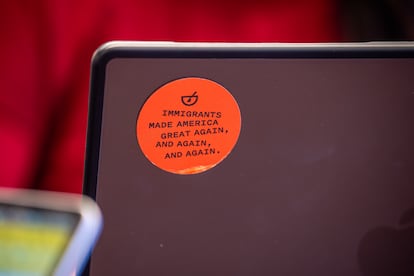
“Go everywhere and talk to everyone” are the slogans of this son of Colombian and Mexican parents, raised in Chicago and representing a district that is 65% Latino. “Too often, politicians treat Latino voters as a box to check. Our campaign is different: we are focused on community events: food tours, Spanish-language meetings or a boxing match viewing party,” Gallego is quoted as saying by his campaign.
The congressman, who came to the House of Representatives aligned with the progressive wing of the party, has been moderating his positions to adapt them to a public, that of Arizona, characterized by a greater moderation in their positions than in other areas of the country. This includes his stance on irregular immigration, one of the issues of most concern in this state. He now calls for stronger measures to ensure border security and reform the immigration system, something his campaign claims is in line with the views of the majority of the Latino community. Polls show that the congressman is ahead of his Republican rival in the race for the seat that will be vacated by Kyrsten Sinema in November. He has 45% of the vote to 41% for Lake, with 14% undecided, according to The New York Times poll.
There are still six months to go to the elections, and everything is still up in the air. But one thing is clear: whoever secures the most Latino backing could very well win in Arizona and, thus, hold the key to the White House. Until then, Rosa Rentería will continue to demonstrate for a fair migration system and considering what recommendations to make to their children regarding who to vote for: “I’ll have to give it a good think.”
Sign up for our weekly newsletter to get more English-language news coverage from EL PAÍS USA Edition
Tu suscripción se está usando en otro dispositivo
¿Quieres añadir otro usuario a tu suscripción?
Si continúas leyendo en este dispositivo, no se podrá leer en el otro.
FlechaTu suscripción se está usando en otro dispositivo y solo puedes acceder a EL PAÍS desde un dispositivo a la vez.
Si quieres compartir tu cuenta, cambia tu suscripción a la modalidad Premium, así podrás añadir otro usuario. Cada uno accederá con su propia cuenta de email, lo que os permitirá personalizar vuestra experiencia en EL PAÍS.
¿Tienes una suscripción de empresa? Accede aquí para contratar más cuentas.
En el caso de no saber quién está usando tu cuenta, te recomendamos cambiar tu contraseña aquí.
Si decides continuar compartiendo tu cuenta, este mensaje se mostrará en tu dispositivo y en el de la otra persona que está usando tu cuenta de forma indefinida, afectando a tu experiencia de lectura. Puedes consultar aquí los términos y condiciones de la suscripción digital.








































